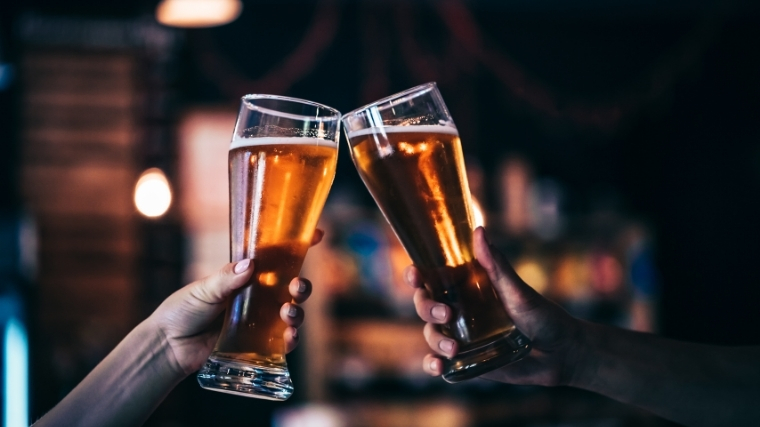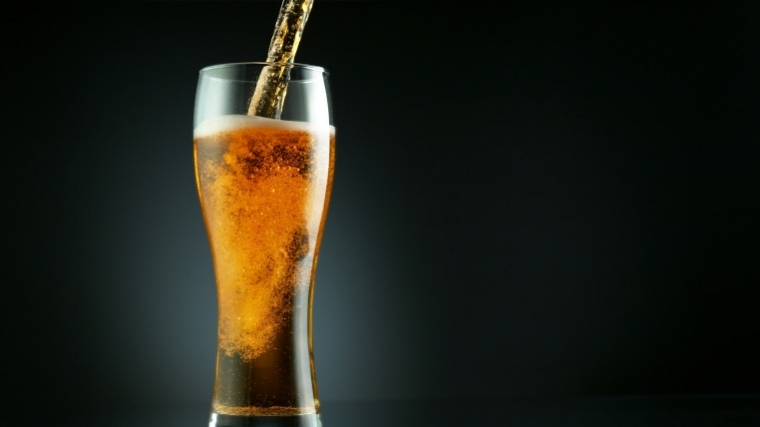Most people typically chug a protein shake after an intense training session, but what if you could trade that for a beer or a cocktail after your workout? We know what you’re thinking, “Isn’t drinking bad for your muscles and overall health?” There’s some truth to that, but there are layers to that statement.
Think about alcohol as a sugar-laden pastry — you should limit how much you have. Still, the occasional treat won’t derail your progress so long as everything else (sleep, overall caloric intake, etc.) is in check.
We’ll dive a little deeper into the science of how exactly alcohol interacts with your body, how it can affect your workouts, and how much of it you should drink. In the end, you should feel better about indulging in the occasional cold one.

[Related: 9 Types of Diets — How They Work and Pros & Cons]
What to Know About Calories and Alcohol
When we say “alcohol,” we’re actually referring to ethanol, a naturally occurring organic compound that gives beer and liquor their potency. It has seven calories per gram. So a drink with 14 grams of ethanol — aka alcohol — in it has 98 calories just from alcohol alone.
But alcoholic drinks typically have way more calories than that because of things like mixers, flavorings, and other high-calorie ingredients. So calories will vary by drink-to-drink, from the 100-calorie White Claw to the 780-calorie Long Island Iced Tea.
Calories from alcohol are thought to be so-called “empty” calories, or calories that provide no nutritional value. But alcoholic drinks could provide some nutritional value — wine, for example, has antioxidants and flavonoids from the grapes it’s made from. (Of course, you could also get antioxidants from fruits, vegetables, and/or a greens powder.)
Lastly, if you’re dedicated to counting calories, you should become familiar with the term “discretionary energy,” or calories leftover in an eating plan once all other nutritional requirements have been met. So if you get all your micronutrient needs from your food but at the end of the day you still have a few spare calories left for the day, you can indulge in a Guinness.
But a typical 2000-calorie eating pattern only allows for 270 calories a day to come from “discretionary energy,” which in addition to alcohol includes solid fat and added sugars. Though, most Western eating patterns are high in these kinds of calories because of things like potato chips, pastries, and, yes, high alcohol consumption.
Overconsumption of these calories — which, again, have no nutritional value — has been one of the obesity epidemic’s main drivers. That’s why it’s advised to have as little of them as possible and why they may be not-so-desirable for people who are constantly tracking their caloric intake. (1)

[Related: How to Burn Fat for Weight Loss and More Definition]
The Myths of Post-Workout Beer Studies
Besides it being a Friday night and one of your friends just organized a last-minute soiree, there aren’t many legitimate reasons why you should necessarily have a beer after a squat session. But some of your bros might try to cite certain studies that claim to legitimize booze after the gym, so let’s clarify some of those.
The myth that beer is an ideal post-workout drink probably began in 2007 when media outlets, such as The Telegraph, reported that Spanish researcher Prof. Manuel Garzon of Granada University had found that beer had a better hydration effect than water. However, the problem is that the supposed study was never published, and even the author said the journalists got it wrong.
The professor, in truth, actually said, “beer with a four to five percent alcohol level in a moderate amount, 660 milliliters (a little more than a pint), is not better, not worse than rehydration with water.” In other words, it’s about on par with water.
Even published studies are more complicated than newspaper headlines make them seem. One found polyphenols in beer reduced post-workout inflammation, but that study was conducted using non-alcoholic beer. Another found that beverages with about two percent alcohol weren’t on par with after for post-exercise rehydration, though four percent and above did “tend to delay the recovery process.” Another found alcohol could help with rehydration — but only if you got it to two percent alcohol and added sodium.
Finally, one crossover study published in 2015 in The Journal of the International Society of Sports Nutrition found that one beer didn’t adversely affect hydration — but only if they drank as much water.
Now some studies may show beer, wine, and liquor may improve other health markers. For example, one study showed modest intake of wine and beer was linked to an improved heart because of the polyphenols in the drinks. (2)
The key words are “modest intake,” which is defined as seven drinks a week for women and 14 per week for men. Anything above that will negate any health benefits linked to alcoholic beverages. (3) While the science supporting a post-workout beer is mixed, to say the least, the research that says there are more cons than pros is pretty rock-solid.
Why a Post-Workout Beer Could be Bad For You
Alcohol is a poor post-workout beverage choice because it interferes with your body at a time it’s in overdrive trying to repair everything you broke down in the gym.
Remember, exercise damages the body. That’s the point — it creates tiny tears in the muscles, depletes the body of electrolytes, and increases your cortisol (the stress hormone) levels. Once you’re done exercising, your body begins rebuilding broken down muscles and, with the help of rest and nutrients, returning to homeostasis.
Think about everything you typically eat after a workout — protein to rebuild the muscles, carbs to replenish your glycogen stores, and water to replace what you sweated out. As we already discussed, alcohol not only doesn’t contribute anything for all the calories it’s loaded with, but it also makes your body’s job harder.
[Related: The Best Types of Supplements for Performance, Weight Loss, and Health]
A 2014 study concluded that alcohol interferes with muscle protein synthesis and suppresses the anabolic response (or the process in which your body rebuilds itself). While those researchers gave athletes 12 drinks post-workout (talk about a rager), other studies have also found even moderate alcohol consumption impaired skeletal muscle recovery and glycogen resynthesis. (4) (5) (6) (7)
But the real reason why alcohol is a poor post-workout drink is probably because of a reason you’re already familiar with — it hurts your ability to make intelligent decisions. Alcohol directly impairs your brain’s medial frontal cortex, which is responsible for reminding you that you don’t need a second helping of donuts at 10 p.m. or that you indeed can not dance on a table. (8)
Furthermore, while one drink here and there might actually help your testosterone levels, high doses caused a drop of up to 40 percent and growth hormone dropped by about 70 percent. (9)(10)
Can You Have Any Beers After a Workout?
So is a post-workout beer forbidden? Well, it depends. A few of the studies we cited here explain that as long as you drink an equal amount of beer-to-water, you won’t seriously impact your body’s recovery. So a night with the homies is possible — just set a limit and don’t get peer pressured into ordering nachos.
The Takeaway
Low levels of alcohol won’t exactly undo your gains, especially if it’s flanked with a lot of water and nutrients, but it’s far from the optimal post-workout drink. If truly maximizing your recovery is your priority, then you should probably leave the beer in the fridge — it’s not improving anything. Ignore one-off studies and hearsay and do what makes your body feel better. Here are some things to consider when deciding whether to drink post-workout:
- Stick to half a gram of alcohol per kilogram of bodyweight.
- Drink as much water as you do beer.
- Don’t order hat-fat, high-carb bar foods.
- Don’t do it every day.
References
- Deborah A. Cohen, Roland Sturm, Marielena Lara, Marylou Gilbert, Scott Gee, Discretionary calorie intake a priority for obesity prevention: results of rapid participatory approaches in low-income US communities, Journal of Public Health, Volume 32, Issue 3, September 2010, Pages 379–386, https://doi.org/10.1093/pubmed/fdp117
- Arranz S, Chiva-Blanch G, Valderas-Martínez P, Medina-Remón A, Lamuela-Raventós RM, Estruch R. Wine, beer, alcohol and polyphenols on cardiovascular disease and cancer. Nutrients. 2012;4(7):759-781. doi:10.3390/nu4070759
- Morton, R. W., McGlory, C., & Phillips, S. M. (2015). Nutritional interventions to augment resistance training-induced skeletal muscle hypertrophy. Frontiers in Physiology, 6. https://doi.org/10.3389/fphys.2015.00245
- Parr EB, Camera DM, Areta JL, Burke LM, Phillips SM, Hawley JA, Coffey VG. Alcohol ingestion impairs maximal post-exercise rates of myofibrillar protein synthesis following a single bout of concurrent training. PLoS One. 2014 Feb 12;9(2):e88384. doi: 10.1371/journal.pone.0088384. PMID: 24533082; PMCID: PMC3922864.
- Barnes MJ, Mündel T, Stannard SR. Post-exercise alcohol ingestion exacerbates eccentric-exercise induced losses in performance. Eur J Appl Physiol. 2010 Mar;108(5):1009-14. doi: 10.1007/s00421-009-1311-3. Epub 2009 Dec 11. PMID: 20012446.
- El-Sayed MS, Ali N, El-Sayed Ali Z. Interaction between alcohol and exercise: physiological and haematological implications. Sports Med. 2005;35(3):257-69. doi: 10.2165/00007256-200535030-00005. PMID: 15730339.
- Barnes MJ. Alcohol: impact on sports performance and recovery in male athletes. Sports Med. 2014 Jul;44(7):909-19. doi: 10.1007/s40279-014-0192-8. PMID: 24748461.
- Yeung, N., Ralph, J. & Nieuwenhuis, S. Drink alcohol and dim the lights: The impact of cognitive deficits on medial frontal cortex function. Cognitive, Affective, & Behavioral Neuroscience 7, 347–355 (2007). https://doi.org/10.3758/CABN.7.4.347
- Sarkola T, Eriksson CJ. Testosterone increases in men after a low dose of alcohol. Alcohol Clin Exp Res. 2003 Apr;27(4):682-5. doi: 10.1097/01.ALC.0000060526.43976.68. PMID: 12711931.
- Sierksma A, Sarkola T, Eriksson CJ, van der Gaag MS, Grobbee DE, Hendriks HF. Effect of moderate alcohol consumption on plasma dehydroepiandrosterone sulfate, testosterone, and estradiol levels in middle-aged men and postmenopausal women: a diet-controlled intervention study. Alcohol Clin Exp Res. 2004 May;28(5):780-5. doi: 10.1097/01.alc.0000125356.70824.81. PMID: 15166654.
Featured image: Levgenii Meyer/Shutterstock